What Is Web Hosting About, And What Are The Types?
What is web hosting?
Web hosting plays a crucial role in the digital landscape, serving as the foundation upon which websites thrive. But what exactly is web hosting? In simple terms, web hosting refers to the service that enables individuals, businesses, and organizations to make their websites accessible to the world wide web. It involves storing website files, data, and content on servers specifically designed for this purpose. These servers act as the online homes for websites, ensuring that they remain available and accessible to visitors around the clock.
Web hosting encompasses a wide range of technologies, configurations, and options, each with its own unique features and benefits.
In this article, we will explore the various aspects of web hosting, shedding light on its significance, types, and factors to consider when choosing a hosting provider. So let us embark on this enlightening journey to unravel the mysteries of web hosting and discover how it powers the websites we encounter on the internet every day.
Before you look for a web hosting package
There are different types of web hosting with some pros and cons attached to them as well as reasons why you may choose them. If you are in the market for a web hosting package it is important to understand your requirements. Some important questions you will need to ask yourself are:
How much can I afford to spend?
As you will see, web hosting is a cost that will either have monthly, yearly costs, or periodic costs. There are no options that are one-time purchases.
You may find this article interesting: Is there such thing as free web hosting?
What am I going to use the website for in the long term?
You may have short-term goals but getting an option based on this alone could be expensive if not carefully considered. So long-term goals on what you intend to do with your website need to be evaluated.
Am I going to be involved in the maintenance and if so, do I have the skill and time?
Just like a car that will need to be maintained regularly, cleaned, and taken care of to function optimally, so does a website. There are many types of software involved, from the operating system, the web server, web applications, and the various add-on software required for additional functionality, performance, security, and compatibility needs. Depending on the type of web hosting chosen, hardware maintenance will be required as well. A web developer requires technical knowledge of how the website functions on a software and hardware level. A web designer focuses on the creative process. Not just the look and feel but also the usability. Know your role and how you plan to get involved.
Read More: https://webforce.co.za/web-developer-vs-web-designer-vs-web-builder/
Who is my target audience for my website?
Upfront you should have an idea of who you want your website to be viewed by geographically speaking. Is it limited to your country or region or global? Generally, if you are targeting a specific country, it is best to choose an option where the server is hosting in that country. This has reduced latency and overall, slightly better performance for the user, not to mention receiving support from a local company is often much more efficient than global players that rely primarily on forums, blogs and ticketing systems with long waiting times for support.
What data will my website host?
This comes down to governing law and if there are any restrictions on hosting certain types of data outside your country or how data hosted outside your country is managed. South African’s enjoy the protection of the POPI act where data hosted outside South Africa must comply with strict rules which are outlined in the act.

Read more about this here:
www.popiact-compliance.co.za,
https://www.ppmattorneys.co.za
https://cloud.netapp.com
6 types of web hosting
Below are the 6 web hosting options. One thing to note is that I have omitted server specification details. These can be misleading for non-technical users. For example, if you have two machines, shared hosting and a VPS machine with both 1gig RAM and 1 CPU core each, they will NOT perform the same for many other reasons. In this example, the VPS machine will have better performance.
In my opinion which seems to work for me and many others, first, choose the type of hosting that suits your needs then determine the server specs you need for that option. You can always upgrade or downgrade hardware (if the web hosting configuration permit) but it is much harder to change between web hosting options.
Shared hosting
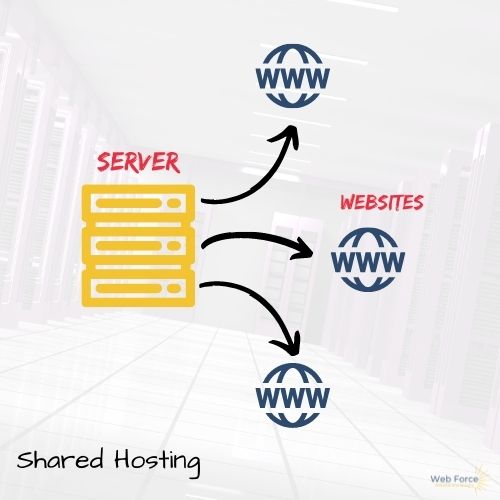
Some of the types of hosting are evident by their name and this is one of them. Shared hosting is a high-powered server with many different client websites on it. These are designed to mostly cater to personal or entry-level websites. Maybe you want to start a blog or a college project, this is a good choice. It is also acceptable for other types of websites where you are not paying great attention to SEO rankings. I won’t dive into SEO’s in this article but essentially better website performance = better SEO rankings. Recent technology has improved making shared hosting perform significantly better but not as good as dedicated hosting. An example of this is by utilizing newer web caching technology like Litespeed.
Core software that keeps the machine and environment running is shared by all websites on the server. There are additional software overheads for client segregation and security which further affect performance. This is obviously not designed for large businesses, nor are they marketed as such.
Cost
- The cheapest type of hosting available
Pros
- Low cost
- Mostly managed by the service provider
- Almost immediately available after purchase
- Less technical knowledge required
Cons
- Poor performance compared to other options
- Limited web applications and web server software supported
- Not scalable for professional, demanding, or enterprise use
- There are many functionality limitations. Custom applications, integration, and other advanced development may not be supported or will not work as expected. Should not impact typical users.
Shared Hosting Providers
VPS hosting
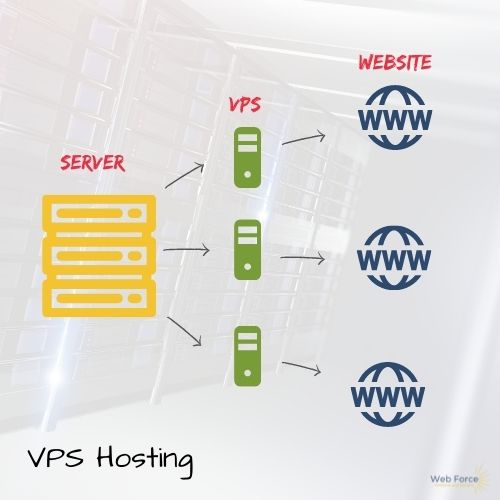
VPS, or Virtual Private Server, stands out as a favored option, combining the benefits of dedicated servers and shared hosting while minimizing drawbacks. Think of VPS hosting like a machine within a machine. The service provider operates a robust single server computer, utilizing software configurations to create multiple virtual computers within it. While this might resemble shared hosting, the key difference lies in each virtual private server having its dedicated resources and operating system. Essentially, your VPS enjoys virtual isolation from all other instances on the same physical server.
Cost
- Slightly more expensive than shared and cheaper than all the other options.
- Bang for buck, this is the cheapest non-enterprise solution.
Pros
- Cheap
- If configured correctly, price/performance economy can’t be matched
- A wide range of operating system types is available
- Ready almost immediately after purchase
- Highly and easily scalable
- High level of security
- Service provider managed hardware
- Flexible web application development for advanced use cases
- Full control over all software
- Dedicated IP
Cons
- Requires a technical expert to set up and maintain the server
- Security and software maintenance is the customer’s responsibility
- All issues within the software environment are the customer’s responsibility.
The cons are scary but fear not, at Web Force we take care of all the VPS cons for you at no additional cost to you.
VPS Hosting Providers
Dedicated hosting
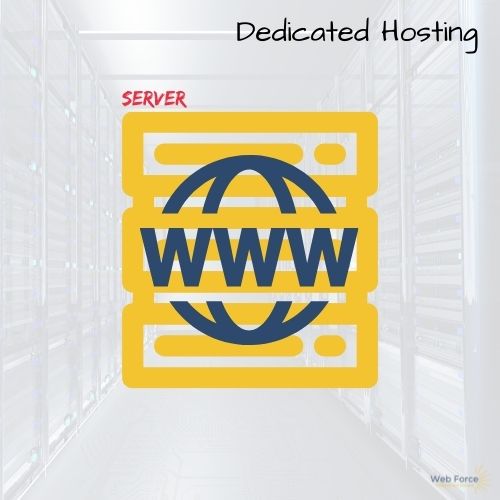
Dedicated hosting means you have a physical machine all to yourself. It is the grandest of solutions with the grandest of costs. You are not sharing a server. This option is ideal for large companies and high-end demanding web application needs.
If web hosting were living spaces, shared hosting would be sharing an apartment with someone. VPS would be owning an apartment in a building. A dedicated hosting package would be owning a stand-alone house.
Just like a VPS server you can do anything and everything but with a dedicated server you have much more resources to play with.
Cost
- Very expensive solution because you get the whole cake.
Pros
- Full control over all software ( and hardware if you have your physical dedicated server)
- Best performance (for a single node)
- Best Security
- Setup any operating system you need
- Dedicated IP
- Flexible web application development for advanced use cases
Cons
- Very high monthly cost with a service provider. If you hosting yourself then a high initial cost with substantial costs to maintain it periodically.
- Although scalable, this can take much longer and with downtime
- Requires a technical expert to set up and maintain the server
- Security and software maintenance is the customer’s responsibility
- All issues within the software environment are the customer’s responsibility
Dedicated Hosting
Managed hosting
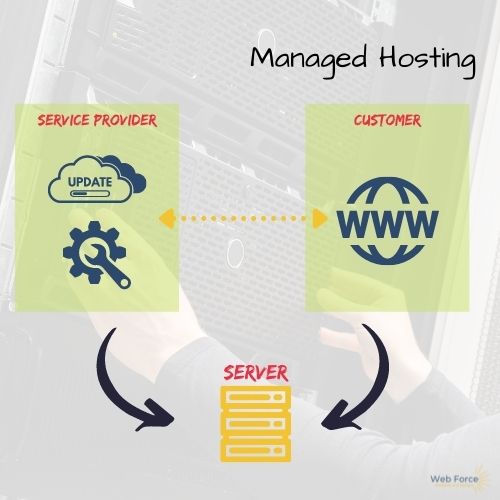
You may see this phrase being thrown around with hosting packages but essentially this is a solution offered by the service provider on top of any of the other web hosting packages on this list. It means that the service provider manages the server the web application is being hosted on. This will differ from provider to provider. Some may manage the operating system only while others will manage the operating system and web server. You must know what they do manage and which parts you will manage.
Because it greatly impacts the web hosting package you receive it is worth having Managed Hosting separately on this list.
Cost
- Varies and often built into existing costs
Pros
- Great for non-technical or time constraint users
- Security maintenance and backup managed by service provider. Often, they follow best practices.
- Issues on the back-end often resolved by the service provider
Cons
- Limited control on what you can manage and do
- Depending on the hosting provider and package, additional costs may be incurred for special configuration
- Settings you do not have access to need to be requested and has a lead time
Cloud hosting
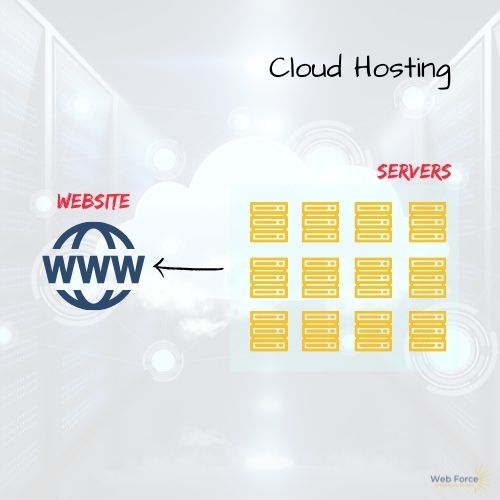
Cloud hosting is often confused with some of the other hosting solutions but is different from the others. Instead of renting a single machine or space much like the others, you are renting a service. This service is hosted on a network of machines by the service provider. It is built to provide a flexible and on-demand solution. That means that it is available instantly and can be scaled up or down as needed.
This is chained with one of the other web hosting options or provided as a packaged solution by the service provider to provide higher performance, meet higher traffic demands or deliver content or special functionality to the end-user.
Cost
- Free solutions available for micro applications
- For more sophisticated solutions it is often pay-as-you-use.
Pros
- Improve general performance
- Provide improved performance over large geographical regions
- Increased security
- Continuous service in case of failure at any point
- Best scalability
Cons
- Technical knowledge required to set up and configure
- Expert knowledge required for large enterprise solutions
- Increased vulnerability or exposure nodes. Cloud expert engineer required.
- Resource monitoring required to optimize usage
Colocation
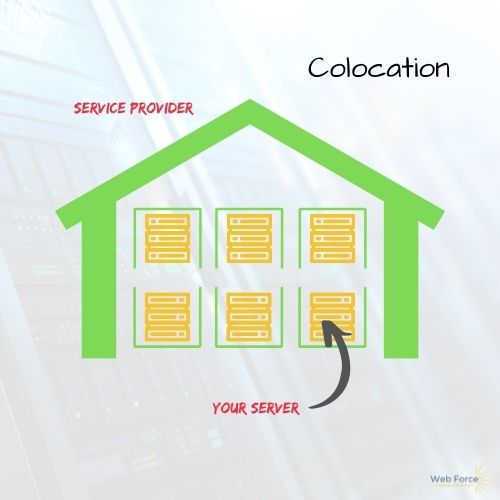
Colocation or just colo is a solution where a company rents a physical space where the company provides the actual server and the service provider takes care of the internet connectivity/bandwidth, electricity, physical security, and cooling. Basically, renting a safe place to put your server.
For the non-technical audience, servers can be really large and expensive and not always the size of a desktop tower.
There are many reasons to do this and web hosting is not on top of that list. But it can be done.
- This solution is often put in place as a disaster recovery backup
- A shared office park or building with a common server location
- To adhere to or maintain compliance within an industry
- When a company is changing offices this service is required and can minimize downtime
- Company downsizing or winding-up
These are just some popular use cases. This will also depend on your own country or geographic location as sometimes it may be cheaper to rent space. In South Africa with our periodic rolling blackouts, this may be essential as backup power is costly to implement on a data centre. I have to stress that it all comes down to what works for you.
Cost
- Varies
- The most expensive solution for small/medium businesses
- More affordable for large enterprises (as compared to hosting and managing their own datacentre)
Pros
- Additional physical security
- Less risk for downtime due to power outages and network failures
- You maintain full control over your equipment
- Higher Compliance with industry regulations
- Cheaper than managing your datacentre
Cons
- This is a long term commitment
- All the knowledge and expertise of managing a dedicated server are required
- Some poor IT guy may need to drive up to the datacentre now and then
- Expensive for small businesses
Summary
As you may have seen, the options are not so straightforward as selecting between A, B, and C. There are hybrid solutions that multiply the options available. So now that you know a bit more about the hosting options available, I sincerely hope it helps you make a good long-term decision when you do need to pick out a web hosting option.


